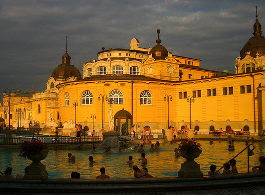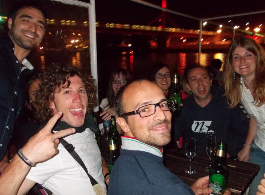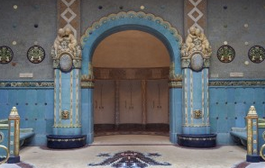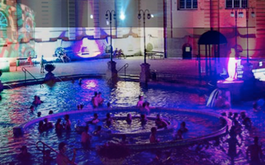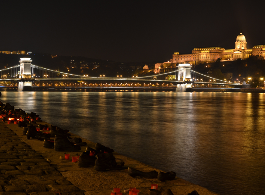Some Useful Words in Hungarian: Survival Vocabulary with Pronunciation
Knowing some basic words like Thank you, Goodbye in Hungarian is always useful, and you will surely get appreciation from Hungarians as admittedly, Hungarian is a really difficult language.
Hello
When you meet middle aged or older people you don’t know it is best to use simple formal greeting like
Jó napot (yoh nu-pot): Good day!
Younger people will be comfortable with Hello. We also use Szia (see-yah) in Hungarian, which, unlike the similar sounding See yo, is used for both greeting somebody and saying farewell. Then there are loads of slangish versions – also used in two-ways – like Csá (tshaa), Csákó (tshaa-koh), etc. But unless you are not feeling the urge for giving a high-five and sharing your earphones, the best is to stick to Hello or Szia.
Goodbye
To unknown adults (30+) you can say farewell with a simple (‘See you’) Viszlát! (vis-laat) or the longer version of the same thing, if you don’t mind twisting your tongue: Viszontlátásra (vee-sont-laa-taash-raa). The meaning is See you again, just like with Viszlát.
Young style Viszlát can be Szia (see-yah), Hello (yes, we also use it for saying goodbye!), or even the Italian Ciao.
Nice to meet you
If you want to save time, and be natural, just smile and keep eye contact, usually that’s enough. If you want to be polite and more formal, you can say:
Örülök, hogy megismertem (errel-oek hodge megh-ish-merh-them)
Thank you
Thank you is Köszönöm in Hungarian. Say something like khoe-se-noem or kher-ser-nerm. The letter ö stands for a sound that is similar to the er in her, or the e inthe French petit or the ø in Danish Søren Kierkegaard. Hope this helps. If not, just say ko-so-nom, the effort will be surely understood and appreciated.
Street, Road, Square, Boulevard
Street names in Budapest are usually the names of famous people or – less frequently – any characteristic word of that street e.g. the names of flowers, jobs, etc. The word ‘street’ is ‘utca’ (oot-tsah) in Hungarian. Road is ‘út’ (oot) Square translates as ‘tér’ (tehr), and boulevard as ‘körút’ (kerr-oot)
Left, Right, Straight Ahead, Map
Left is ‘bal’ or ‘balra’ – depending on being in the location or going to that location, respectively. Bal is pronounced as bhal, and balra is bhal-raa.
Right is ‘jobb’ or ‘jobbra’ – depending on being in the location or going to that location, respectively. Jobb is pronounced as yoab, and jobbra is yoab-raa.
Straight ahead is ‘egyenesen’ or ‘egyenesen előre’. Say egyenesen as edge-en-esh-en, and előre (ahead) as e-lerr-eh.
Map is térkép in Hungarian (space-picture in a literal translation of the compound). Say thayr-khayp. Show me on the map translates as follows: Mutassa a térképen (moo-tash-shaa a thayr-kay-pen).
Please
Please can be more formally kérem (khay-rem) or legyen szíves (le-gen see-vesh), less formally, said to young adults légyszi (ledge-see)
District
Once you are in Budapest, you will realize that it’s a useful word to know or at least the concept to know about. Budapets has got several district all indicated in Roman numbers under the street names, so even if you seem to get lost, you can read which district you are in. The most central district is the fifth district or kerület (kherrel-let), i.e. V. ker. (kerület is often abbreviated to ker.)
Ticket
Ticket is jegy (yedge) and you must show your ticket to the ticket inspectors (especially frequent at metro stations), who are almost always on the alert. So you should always validate your ticket or tickets if you change lines to avoid embarrassing or unpleasant experiences and pricey fines in Hungary.
Wine, beer, juice, coke, tea, coffee, water etc.
Wine is bor (bhor), red wine is vörös bor (verresh bhor) and white wine is fehér bor (fae-hayr bhor). Sör (shir) is the Hungarian equivalent of beer and you will find several Hungarian shirs to choose from. Juice is juice, coke is kóla (kho-la), water is víz (veeze), tea is tea (theh-ah), coffee is kávé (kah-vay). Két sört kérek (kate shirt kay-reck) means Two beers please. Két bort kérek (kate bhort kay-reck) means Two wines please.
One, two, three, four, five, six, seven, eight, nine, ten, hundred, thousand
Hungarian counting is easier (although less punctual in its pronunciation!) if you associate the numbers with existing words: 1 egy (edge), 2 két (kate), 3 három (haa-rem), 4 négy (naydge), 5 öt (at), 6 hat (heart), 7 hét (hate), 8 nyolc (nolts), 9 kilenc (key-lents), 10 tíz (tease), 100 száz (size), 1000 ezer (as err). 🙂
Budapest Love Life
I love you is one word in Hungarian: Szeretlek (sare-at-lack or in easy-style sir-at-lack). Kiss is csók (choke), but the Hungarian puszi (pussy) is a lighter form of csók, usually given on the cheek, not on the mouth – and Hungarians oftentimes give puszi (2 of them! one on the left and one on the right side) when they meet and greet each other. Kiss me is Csókolj meg (choke-oy megh). Sleep with me in a lighter sense is Aludj velem (ul-oodj val-am), while in a more hardcore version it’s Feküdj le velem (fack-oodj leh val-am). Don’t expect to get a positive response after several romantic dates, though.
Expensive, cheap, good, bad, happy, very, beautiful
Expensive can be dear too so it is an ambigous word drága (drah-gah), the opposite is olcsó (all-cho). Good is jó (yoh or yoo) and bad is rossz (ross), happy is boldog (resembles bulldog, right?). Very is nagyon (nah-john), so very good is nagyon jó (na-john yoo). Beautiful is szép (sape).
Kiss
Kiss is puszi in Hungarian (pussy), and is sometimes used as goodbye (by young teen girls). Don’t be surprised.
